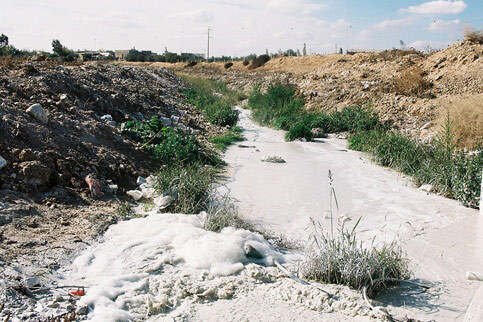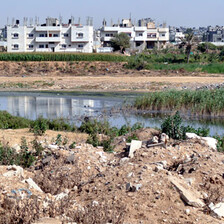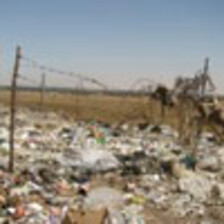The Electronic Intifada 31 December 2007

The polluted Hebron River inside Israel. (Shabtai Gold/IRIN)
BEER SHEBA/RAMALLAH, 30 December (IRIN) - In what should be a dry river bed at this time of year, grey water flows, revealing the extent to which the River Hebron, which runs from the West Bank into Israel, is polluted. The stench underlines the problem.
“Most transboundary streams in the region are contaminated and characterized by widespread pollution from Palestinian sources [typically raw sewage], as well as a variety of … sources from within Israel,” said a working paper, entitled Monitoring Transboundary Palestinian-Israeli Streams, released in December by the Arava Institute and other Israeli and Palestinian organizations.
In some cases, downstream Palestinian towns receive Israeli waste. There are at least 10 transboundary streams in the region, with flows that go both ways. Untreated waste water from the West Bank can even end up flowing via Israel into the Gaza Strip and then the sea.
The pollution not only destroys the rivers and the connected eco-systems, but also seeps into the groundwater, harming drinking water sources. Furthermore, it leads to mosquito infestations, allowing diseases like West Nile Fever to spread.
“When people see a polluted river, they dump their garbage there, causing even more pollution and contamination,” Ofer Shaulker, from the Besor Drainage Authority, which is responsible for the area, told IRIN, while standing on a pile of industrial waste on the riverbank.
After spending three years studying the contents of the Hebron and Alexander (Al-Khalil and Zomar, in Arabic) rivers, the researchers concluded that “the results confirm the necessity of cooperation in watershed management.”
Cooperation hampered
However, while there are some examples of Israeli and Palestinian joint efforts, for the most part, the security and political situation in the region has adversely affected true cooperation.
Experts on the issue, including people such as Gershon Baskin of the Israel/Palestinian Centre for Research and Information, and Nader al-Khatib of the Palestinian Water and Environmental Development Organisation, say the problem lies in the Israeli government’s insistence that waste water treatment plants set up in the West Bank also serve the Israeli settlements there.
The Palestinians have refused to allow the treatment plants to be linked to the israeli settlements, as this would be seen as legitimizing the existence of these settlements deemed illegal under international law.
The two experts also share another viewpoint: why — in the nearly 30 years between the Israeli occupation in 1967 and the Oslo Accords, which gave birth to the Palestinian Authority (PA) “didn’t Israel build treatment centers” in the West Bank, they asked rhetorically.
“It’s win-win or lose-lose for both sides,” Khatib said, suggesting that instead of politically contingent bodies, Israel and the Palestinians set up independent environmental working groups to solve problems.
Barriers damage environment?
Jamil Matour, deputy director of the Palestinian Environmental Quality Authority, a PA agency, said Israel, in addition to refusing to grant the Palestinians permits to build several waste treatment centers for themselves, has also damaged the environment through its system of barriers and checkpoints.
“My staff can’t travel freely. They can’t visit Area C,” the part of the West Bank under full Israeli control, “to investigate and report on problems there”, he said, adding that Israel’s Barrier was a “strategic threat against the ecological balance in the region, interrupting natural life cycles.”
While most waste water emanates from homes, a fair percentage comes from West Bank industry, like the stone quarries. A new Italian-funded project is supposed to help reduce the runoff from the quarries.
“I hope it will be implemented soon,” Matour said. “The pollution of the River Hebron is very dangerous for all of us, the Israelis and the Palestinians.”
Israel’s Civil Administration in the West Bank did not respond to repeated queries regarding the permits.
Groundwater damaged
Waste water that flows from the West Bank into Israel is treated by Israeli plants, though by that time it has already damaged the groundwater. Israel charges the PA for the service, but the treated water remains in Israel, depriving the Palestinians of the ability to reuse the water for their agriculture.
Lior Assaf, an Israeli hydrologist and one of the report’s researchers, said it would be best for the Palestinians to handle their own waste and thereby catch the pollution at source. They would also then be able to reuse the treated water.
With the Paris donors conference completed, and over $7.5 billion pledged, Matour and many environmental groups are hoping stagnated projects — such as those halted when Hamas was elected — will be revived, but insist that a true solution requires a change in some Israeli policies as well.
A German-funded project to build treatment centers will take several more years to complete, still leaving a void.
In the meantime, Israel plans to build what it says will be the largest river park — a public amenity as well as a pollution-free zone — in the Middle East, along where the River Hebron meets the River Beersheba, in an attempt to curb damage to those two water courses.
This item comes to you via IRIN, a UN humanitarian news and information service, but may not necessarily reflect the views of the United Nations or its agencies. All IRIN material may be reposted or reprinted free-of-charge; refer to the copyright page for conditions of use. IRIN is a project of the UN Office for the Coordination of Humanitarian Affairs.


